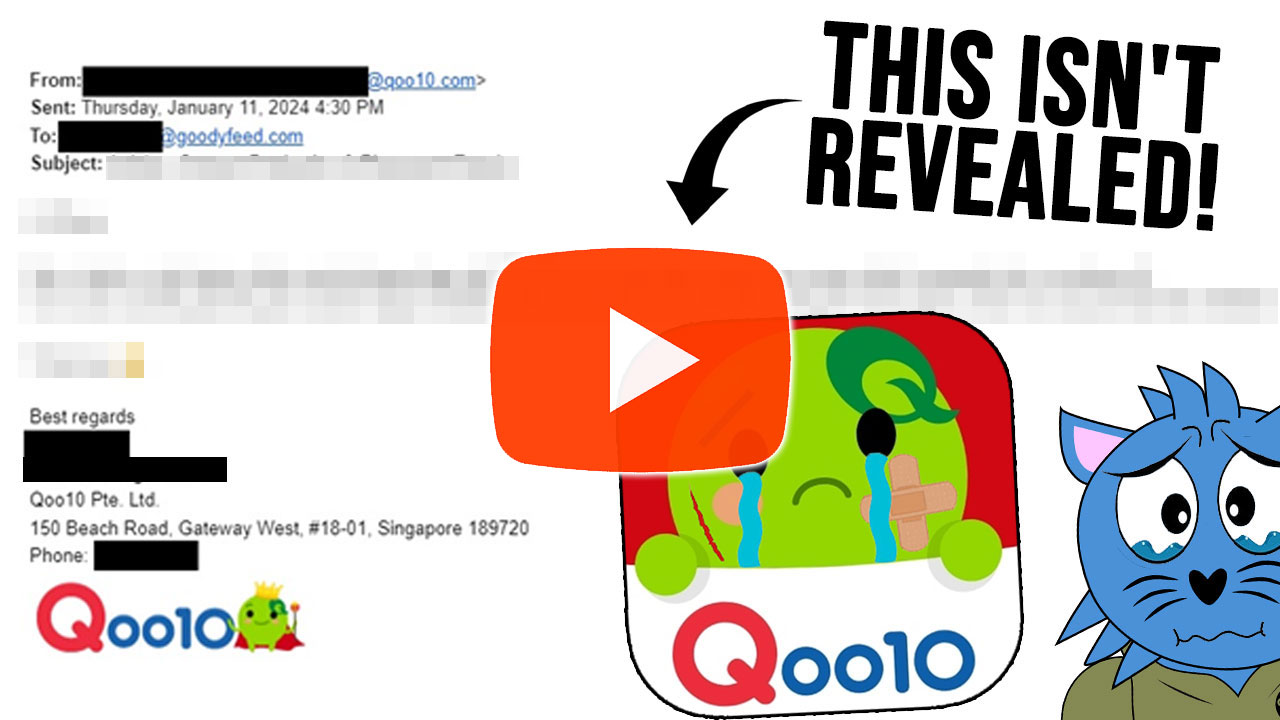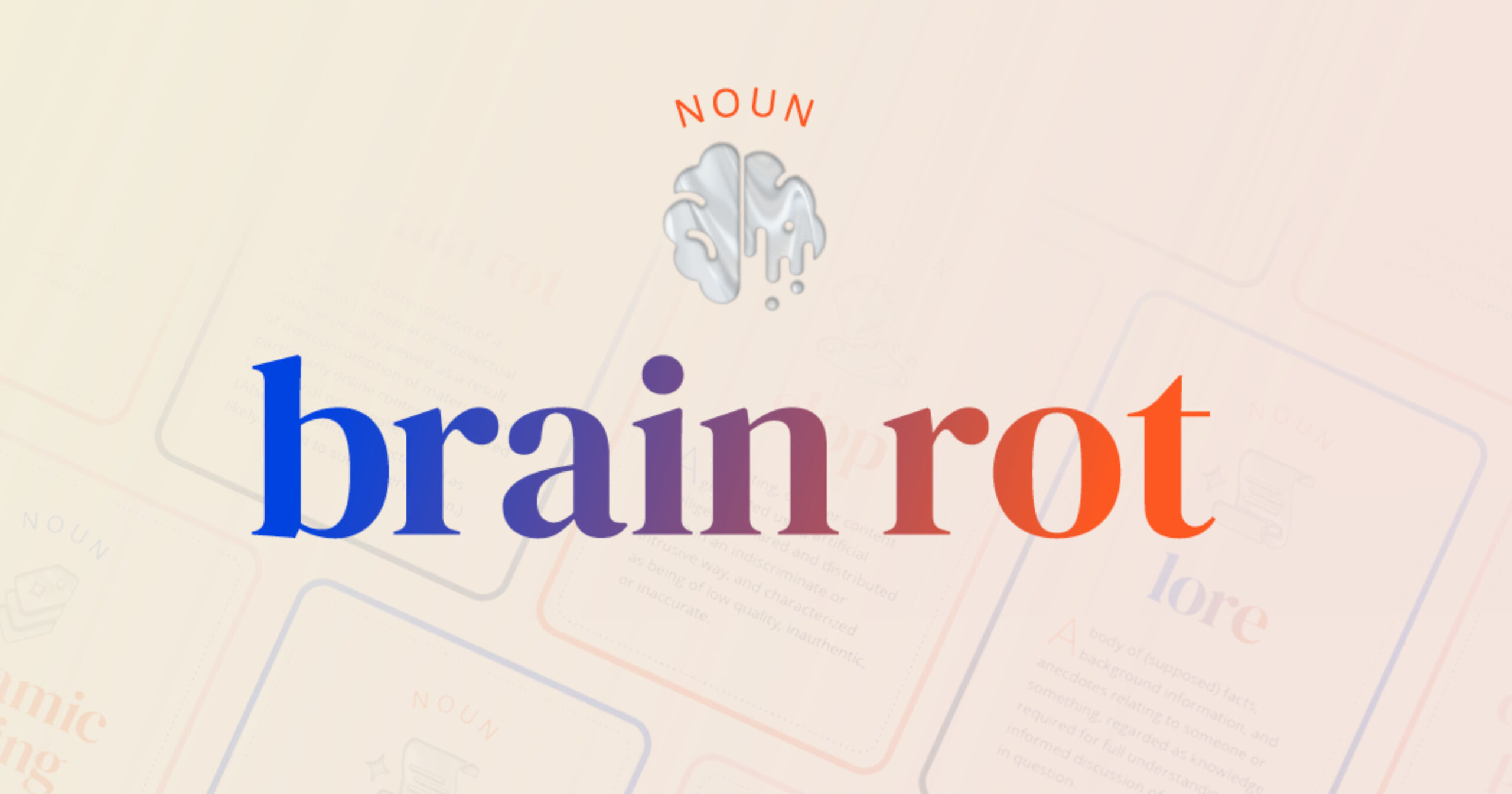It’s that time of the year again. And no, we’re not talking about Christmas, we’re talking about the release of the Oxford Word of the Year.
Depending on how much time you spend on TikTok, you may or may not have heard of the 2024 Oxford Word of the Year — “brain rot”. If you haven’t, here’s what it means.
“Brain Rot”: The 2024 Oxford Word of the Year
Every year, thousands of people vote for the Oxford Word of the Year out of a few shortlisted words. Last year, the Oxford Word of the Year was “rizz” and two years ago, it was “goblin mode” — both words were popularised mostly by social media.
This year isn’t any different. The 2024 Oxford Word of the Year, “brain rot”, is also a term distinctively popularised by social media.
For those of us who haven’t heard of the word before, “brain rot” is defined as “the supposed deterioration of a person’s mental or intellectual state, especially viewed as the result of overconsumption of material (now particularly online content) considered to be trivial or unchallenging. Also: something characterized as likely to lead to such deterioration”.
It’s a mouthful lah, but it’s essentially what every Tiger Mom has been saying about phones and social media for ages — use your phone excessively and your brain will start to rot.
And your grades will drop, your friends will unfriend you, you’ll never be able to find a girlfriend, etc. You know how the lecture usually goes lah.
Perhaps that’s why some have viewed “brain rot” as an indicator of how the overconsumption of online content is affecting society, as well as individuals’ mental health.
But, of course, the definition above only scratches the surface of what “brain rot” is. If you’ve spent any time on social media at all (or if you have kids that spend way too much time on their phones), you’ve probably heard of some “brain rot” terms.
From “skibidi”, which originated from the “skibidi toilet” meme (of a humanoid toilet), to “Ohio”, which is generally used to describe something as weird, the laundry list of “brain rot” goes on and on. Terms like “fanum tax” and “gyatt” are examples of other terms commonly used on TikTok, which have also been dealt the label of being “brain rot” content.
Don’t even need to watch the “brain rot” content sia, reading these words alone are enough to make you feel the “brain rot”.
Usage Frequency of “Brain Rot” Increased By 230% From 2023 to 2024
So, how did the term “brain rot” even come about?
According to Oxford University Press, the first recorded use of the term “brain rot” was all the way back in 1854 in Henry David Thoreau’s book Walden.
However, in recent years, the use of “brain rot” has seen more widespread usage, with its usage frequency increasing by 230% from 2023 to 2024.
The culprit for the term’s resurgence? As alluded to above, it’s TikTok. If you’re addicted to TikTok, then you probably love “brain rot” content.
This is why people say not to spend so much time on your phone.
Other Words Shortlisted for 2024 Oxford Word of the Year
If you’re wondering what are the other words shortlisted for the 2024 Oxford Word of the Year which, fortunately or unfortunately, lost to “brain rot”, here they are:
- demure
- dynamic pricing
- lore
- romantasy
- slop
And if you’re now thinking: “Wow… I don’t know what half of these words are supposed to mean.” Well, it’s understandable — some of these words were created by TikTok.
The first word, “demure”, means literally what you think it means. It either refers to a person who is “reserved or restrained inappearance or behaviour”, or clothing that isn’t “showy, ostentatious, or overly revealing”. The word made its way into the Oxford Word of the Year shortlist, once again, because of TikTok.
The word “demure” was popularised by a TikTok trend where people would point to, for instance, their clothing choices or makeup look, and describe it as “very demure, very mindful”. You might even have seen the TikTok videos by the Singapore Civil Defence Force (SCDF) or the Mandai Wildlife Reserve hopping onto this trend.
@myscdf Stay mindful and demure with these key points to note before grabbing a fire extinguisher the next time! #TheLifeSavingForce #TampinesFireStation #GuardiansOfTampines ♬ original sound – Singapore Civil Defence Force
@mandaiwildlifereserve Did our millennials, Suresh and Joseph, understand the assignment? 👀 #MandaiWildlifeReserve #RiverWonders #genz #genzmarketing #genzhumour #genzslang #viral #funnyvideos #singapore #sg #sgtiktok ♬ AnySoundEffects Elevator Music – Any Sound Effects
Next, the term “dynamic pricing” also saw a surge in its use after dynamic pricing, which is the practice of varying the price for a product or service to reflect changing market conditions, was used to set prices for concert tickets.
The term “lore” is also quite literally what is sounds like — “a body of (supposed) facts, background information, and anecdotes relating to someone or something”. The term has been used, for instance, to talk about “the lore surrounding a particular celebrity, or a character in a book or film” or even one’s “own personal history”.
For example, your OG childhood best friends would know about your “lore”, but not those who you’ve only recently met.
The term “romantasy”, which is “a genre of fiction combining elements of romantic fiction and fantasy”, saw an increase in usage in the past year possibly also due to TikTok, where the genre is rather popular.
Ah… Everything is always about TikTok nowadays.
Last, we have “slop”, which refers to “art, writing, or other content generated using artifical intelligence, shared and distributed online in an indiscriminate or intrusive way, and characterized as being of low quality, inauthentic or inaccurate”.
According to the Oxford University Press, in 2024, the term was used mostly to refer to material produced using a large language model (for example, ChatGPT) which is frequently seen to be low-quality or inaccurate.
So, what’s your take? Do you think “brain rot” is worthy of being the 2024 Oxford Word of the Year? Or are the other shortlisted words more deserving of the title?
Watch this for a complete summary of what REALLY happened to Qoo10, and why it’s like a K-drama:


Read Also:
Advertisements

